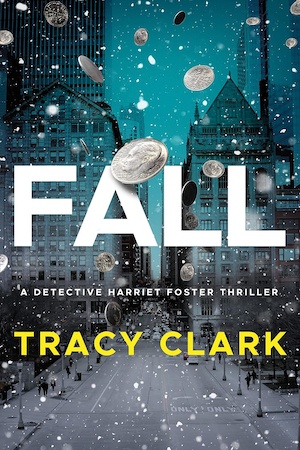
Political corruption, like death and taxes, is always with us, a fact that Chicagoans know better than most. Chicago has long been considered America’s most corrupt city, with one investigation suggesting more than $500 million leaves the system each year to pockets unknown. An incredible number, and the kind of graft that crime fiction authors would be driven to write about.
After three years in prison, corrupt Alderman Marin Shaw kicks off Tracy Clark‘s gritty second novel featuring CPD Homicide Detective Harriet Foster. Shaw was guilty of corruption, no doubt about that, but shame and a fear of the consequences made her decide not to trade information about her co-conspirators for a reduced sentence. This was against the advice of her lawyer, Charlotte Moore. Now Shaw is out – and life on the outside isn’t easy. Her reputation is in tatters, her political and legal careers are dead in the water. Her husband Will has thrown her out, and, in any case, is having an affair, and her daughter Zoe has behavioural problems.
All Shaw wants is to keep her head down and rebuild her relationship with Zoe, but others have different plans. Her old colleagues aren’t convinced Shaw will stay silent and Alderman John ‘Cubby’ Meehan, having one hand already on the mayor’s seat, isn’t prepared to put much trust in her. Shortly after an acrimonious meeting between the aldermen breaks up, Deanna Leonard, another who benefitted from Shaw’s silence, is found shot dead in her car. Leonard had spoken up for Shaw at that secret meeting. Is it Meehan cleaning house? The autopsy reveals 30 silver dimes had been forced down Leonard’s throat – an image echoed on the cover. The suggestion of Leonard as Judas places Shaw in the frame.
Foster, and her partner, Detective Vera Li, catch the case. Foster is recovering from a number of losses. She has recently divorced; her son, Reg, was murdered; and her last police partner, Glynnis Thompson, has recently shot herself in the head after pulling in to the police parking lot. As far as Foster knew, Thompson had a stable home and professional life. Her suicide remains a mystery, making it harder for Foster to grieve for her. Foster and Li are still getting to know one another and a high pressure case like this will test their nascent working relationship.
I was struck early on, in an entirely positive sense, that Fall is a book where female relationships are explored heavily. Whether it be Foster and Thompson, Foster and Li, Shaw and Moore, or Shaw and Zoe, each relationship is deep, complex and different. There is a distinct emotional intelligence at work in this novel, which sets it apart from a lot of other hardboiled crime fiction.
Fall has been likened to the Harry Bosch books by Michael Connelly, and I can see in the detectives’ devotion to duty and the deftness of the author’s plotting how the comparison arises. Bosch, though, is a brooding presence, and it’s refreshing to see a different depiction of how detectives deal with the pressures of the job.
Aside from the main investigation, Clark gives her detective a second, off-the-books case. Thompson, it’s revealed, was being forced by an unknown criminal to do their bidding in order to keep her family safe from reprisal. Now Foster begins receiving the same pressure. This story line is kept open – presumably to be resolved in the next book. And Fall is a strong enough addition to the procedural canon to make me confident we will see Foster and her colleagues return.
Thomas & Mercer
Print/Kindle
£3.29
CFL Rating: 4 Stars


Using our associate/affiliate links helps support the site.








